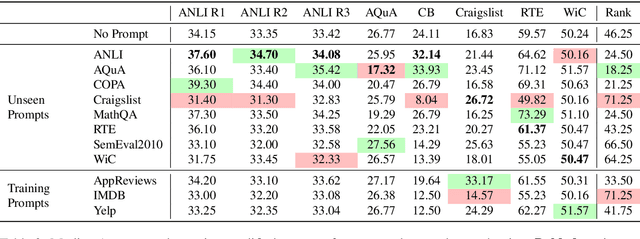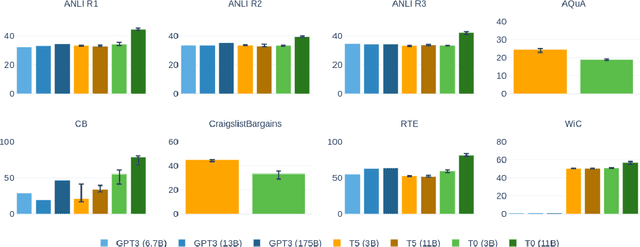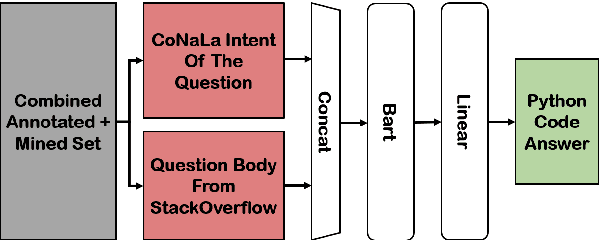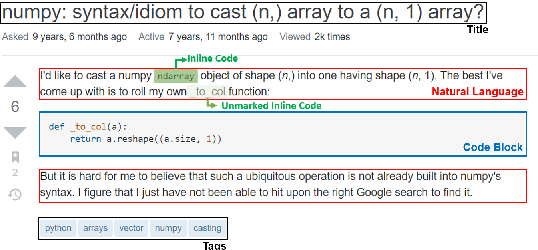Gabriel Orlanski
Measuring The Impact Of Programming Language Distribution
Feb 03, 2023



Abstract:Current benchmarks for evaluating neural code models focus on only a small subset of programming languages, excluding many popular languages such as Go or Rust. To ameliorate this issue, we present the BabelCode framework for execution-based evaluation of any benchmark in any language. BabelCode enables new investigations into the qualitative performance of models' memory, runtime, and individual test case results. Additionally, we present a new code translation dataset called Translating Python Programming Puzzles (TP3) from the Python Programming Puzzles (Schuster et al. 2021) benchmark that involves translating expert-level python functions to any language. With both BabelCode and the TP3 benchmark, we investigate if balancing the distributions of 14 languages in a training dataset improves a large language model's performance on low-resource languages. Training a model on a balanced corpus results in, on average, 12.34% higher $pass@k$ across all tasks and languages compared to the baseline. We find that this strategy achieves 66.48% better $pass@k$ on low-resource languages at the cost of only a 12.94% decrease to high-resource languages. In our three translation tasks, this strategy yields, on average, 30.77% better low-resource $pass@k$ while having 19.58% worse high-resource $pass@k$.
Evaluating How Fine-tuning on Bimodal Data Effects Code Generation
Nov 15, 2022Abstract:Despite the increase in popularity of language models for code generation, it is still unknown how training on bimodal coding forums affects a model's code generation performance and reliability. We, therefore, collect a dataset of over 2.2M StackOverflow questions with answers for finetuning. These fine-tuned models have average $pass@k$ improvements of 54.64% and 85.35% on the HumanEval (Chen et al., 2021) and Mostly Basic Program Problems (Austin et al., 2021) tasks, respectively. This regime further decreases the number of generated programs with both syntax and runtime errors. However, we find that at higher temperatures, there are significant decreases to the model's ability to generate runnable programs despite higher $pass@k$ scores, underscoring the need for better methods of incorporating such data that mitigate these side effects. The code can be found https://github.com/gabeorlanski/bimodalcode-generation
Evaluating Prompts Across Multiple Choice Tasks In a Zero-Shot Setting
Mar 29, 2022



Abstract:Large language models have shown that impressive zero-shot performance can be achieved through natural language prompts (Radford et al., 2019; Brown et al., 2020; Sanh et al., 2021). Creating an effective prompt, however, requires significant trial and error. That \textit{prompts} the question: how do the qualities of a prompt effects its performance? To this end, we collect and standardize prompts from a diverse range of tasks for use with tasks they were not designed for. We then evaluate these prompts across fixed multiple choice datasets for a quantitative analysis of how certain attributes of a prompt affect performance. We find that including the choices and using prompts not used during pre-training provide significant improvements. All experiments and code can be found https://github.com/gabeorlanski/zero-shot-cross-task.
Reading StackOverflow Encourages Cheating: Adding Question Text Improves Extractive Code Generation
Jun 08, 2021



Abstract:Answering a programming question using only its title is difficult as salient contextual information is omitted. Based on this observation, we present a corpus of over 40,000 StackOverflow question texts to be used in conjunction with their corresponding intents from the CoNaLa dataset (Yin et al., 2018). Using both the intent and question body, we use BART to establish a baseline BLEU score of 34.35 for this new task. We find further improvements of $2.8\%$ by combining the mined CoNaLa data with the labeled data to achieve a 35.32 BLEU score. We evaluate prior state-of-the-art CoNaLa models with this additional data and find that our proposed method of using the body and mined data beats the BLEU score of the prior state-of-the-art by $71.96\%$. Finally, we perform ablations to demonstrate that BART is an unsupervised multimodal learner and examine its extractive behavior. The code and data can be found https://github.com/gabeorlanski/stackoverflow-encourages-cheating.
 Add to Chrome
Add to Chrome Add to Firefox
Add to Firefox Add to Edge
Add to Edge